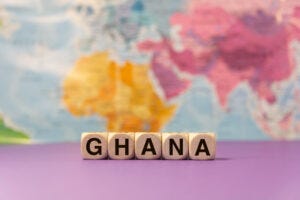April 26, 2023

President Nana Addo Dankwa Afkufo-Addo has announced the construction of Ghana’s first vaccine manufacturing facility.
Ghana is set to begin construction of its first manufacturing plant this July, with the expectation to be fully operational by January 2024.
Under DEKs Vaccine Ltd, a private sector-led consortium of local Ghanaian pharmaceutical firms, the facility will be a fill/finish site, responsible for producing vaccines for rotavirus, cholera, malaria, and pneumonia.

DepositPhotos/Valentine.242
It will primarily manufacture malaria vaccines and import COVID components to assemble, package, and distribute COVID vaccines nationwide and to West Africa. The goal is for the facility to produce 600 million vaccines every year.
The facility has received a €5 million ($5.5 million) grant from the European Investment Bank (EIB). However, according to Public Sector Global the construction will cost $122 million.
“The construction of the vaccine manufacturing plant will help our nation realise the dream of becoming self-sufficient in the production and manufacture of vaccines,” says the President.
Africa’s vaccine program
The decision to construct this facility follows the launch of the 2021 Team Europe initiative, which aims to improve access to vaccines and medicines in Africa.
In 2021, European Commission President Ursula von der Leyen announced a €initiative to support local vaccine and health technology manufacturing in Africa, financed through the European Union (EU) budget and EIB.
This was announced in response to the vaccine inequality highlighted by the COVID-19 pandemic. While western countries had access to finances and resources to manufacture and distribute COVID-19 vaccines, African countries did not have the same capital or capacity to do so. Moreover, Africa imports 99% of its vaccines and 94% of its medicines due to a lack of local production.
The Team Europe initiative will support Africa “to help develop its own pharmaceutical, biotech and medtech industries, and ease equitable access to quality and safe products and technologies,” said von der Leyen.
Challenges
Despite funding and support from Europe, there are multiple challenges Africa will face.
Finding vaccine buyers poses a limitation on African vaccine development due to a lack of demand. This issue was highlighted in 2022 where the production of Johnson & Johnson’s COVID-19 vaccines at Aspen Pharmacare was shut down due to lack of sales.
This puts Africa at an impasse. There is a need to develop vaccinations to improve national health and gain independence yet there are not enough buyers to make the cost worthwhile, as African vaccine production is more expensive compared to more established facilities. Therefore, it is important to create vaccine demand, which needs to come from local governments.
Due to this stalemate, Gavi, the Vaccine Alliance, will be providing the vaccine manufacturers time-limited financial support to build up global competitiveness. The financing of this will not come from Gavi’s budget, but donor funds.
Whilst the European Commission funding has brought Africa closer to being vaccine independent, there is the impression that Europe is unwilling to share intellectual property rights. This poses another challenge for Africa, who does not have the same vaccine technology knowledge which limits production.
About the Author
You May Also Like




